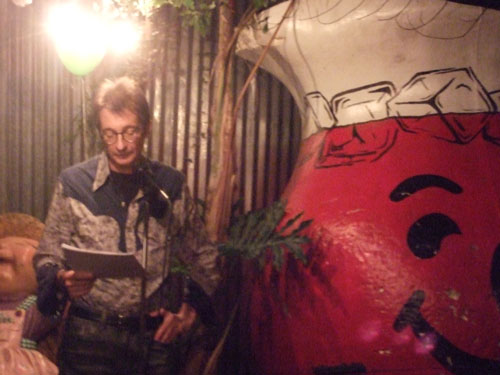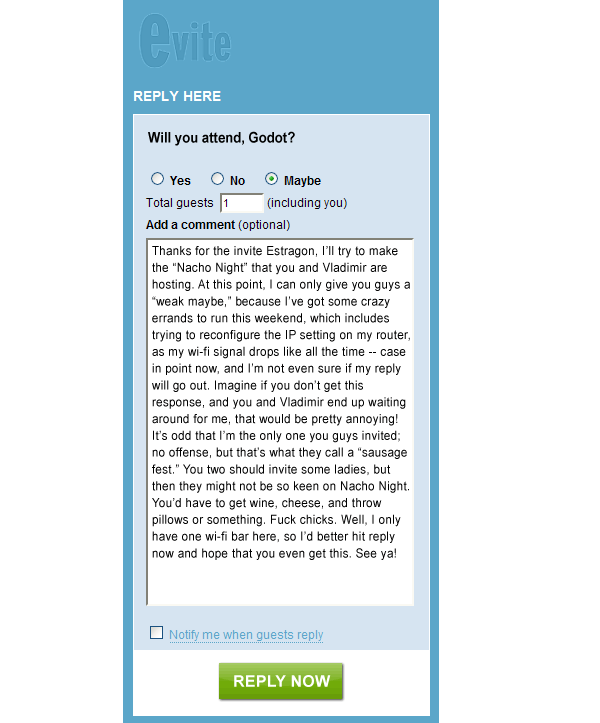I am very blue to learn this afternoon of Cami Park’s passing. Cami lived in Nevada, and she was a sly and observant writer, someone whose work knew the world tenderly and could—as Scott Garson put it—”wake you up where you sleep.” Cami was also a generous and delightful person to correspond with. Read some of her work at Fictionaut, Necessary Fiction, Night Train, PANK, and No Tell Motel. Her blog can be found here. I am sad to have never met Cami Park in person to tell her how much I enjoyed her writing. Her story “Everyone the Same But Not At Once” appeared in NOÖ [11], and I’ve excerpted it below the jump. Cami’s words will live on and around in these windows of ours. She will be missed. READ MORE >
I think if I had to say one book I read this year that killed me the hardest, it would be Pierre Guyotat’s Tomb for 500,000 Soldiers [1967]. I haven’t been able to get it out of my head since. What were your favorite reads of 2010, published in 2010 or otherwise?
Holiday Sales
I’ve tried to gather after the jump as many holiday sales as I could find over the weekend. Secret Santas, pay attention; some of these sales go above the $20 limit, but you can always keep some books, send other books, or bust the limit knowing you might not get the same in return. Any editors/publishers who’d like to drop their special on our internet, do so in the comments or email me and I’ll add the sales here. For those not in Secret Santa, many of these will still apply to you, though some are only for Secret Santa participants. If you haven’t, please consider signing up to participate in the exchange.
Francois VI, Duc de La Rochefoucauld, on Writing
“If I were interested in literary glory I think that with a little trouble I could make quite a name, for I can write good prose and make up decent verse. / I am fond of all kinds of reading, but especially that in which there is something to train the mind and toughen the soul; and above all I find very great enjoyment in sharing my reading with an intelligent person, for in so doing one can continually reflect upon what is being read, and such reflections form the basis of the most delightful and profitable conversation… / I do not think this knowledge of mine will ever pass from my head to my heart.” — from his self-portrait
Voltaire said Rochefoucauld’s Maxims had a huge hand in the formation of taste in French culture, “giving it a feeling for aptness and precision,” says Leonard Tancock, the translator. I found this book randomly at the library, and realized David Shields included it in a reading list posted on The Millions. These ones I thought had something maybe to do with writing or whatever:
Dean Young’s Heart Transplant Fund

From a letter by Tony Hoagland at the National Foundation for Transplants
Dear Friends,
If you are reading this, you are probably a friend of Dean Young and/or a friend of poetry. And you may have heard that our friend is in a precarious position. Dean needs a heart transplant now. He also needs your assistance now.
Over the past 10 or 15 years, Dean has lived with a degenerative heart condition–congestive heart failure due to idiopathic hypotropic cardiomyopathy. After periods of more-or-less remission, in which his heart was stabilized and improved with the help of medications, the function of his heart has worsened. Now, radically.
Donations can be made here (be sure to make the gift in honor of Dean Young), or via an address at the bottom of the link above.
Today David Lynch is answering interview questions on his twitter feed: “When I go out, Kathy who cuts my hair has given me a spray, but I don’t know the name of it.” [Q stream found here.]
False Dichotomies Are Not Honorable
1. Money and art are not mutually exclusive.
2. The issue of a piece of writing’s power as art is a separate issue from the question of whether the piece of writing was published by a large commercial press or a small not-for-profit press.
3. When large commercial presses invest in new literature, despite the market pressures which discourage investment in new literature, those presses should be embraced and supported by the community of readers which also embraces and supports the small presses who invest in new literature.
4. If a work of literature or the person who made it becomes successful in externally validating manners that transcend the small circle of serious readers that constituted the original audience because the work was promoted by the high-powered machinery that can attend to a book released by a large commercial publisher, that work of literature and that writer ought to be congratulated and their worldly success applauded by the small circle of readers that constituted the original audience.
5. Obscurity as a writer is neither inherently honorable nor inherently dishonorable.





